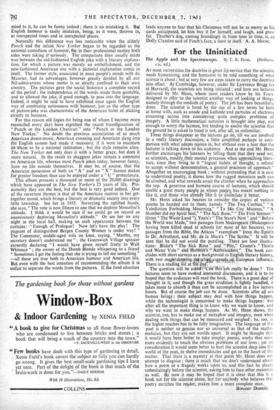For the, Uninitiated
The Apple and the Spectroscope. By T. R. Henn. (Methuen.
25. 6d) • AT most Universities the doctrine is given lip-service that the scientist needs humanising, and the humanist to be told something of what science is about • but at very few are steps taken to carry the doctrine into effect. At Cambridge, however, under Sir Lawrence Bragg (as a Harvard), the 'scientists are being initiated; and here are lectures delivered by 'Mr. Henn, whom -most readers know by his Yeats, designed to Offer to the -scientist another way of looking at things, namely through-the mediuin of poetry-. The job has been beautifully done. The scientist is lured by the use of a few terms he feels at home with such as anode and kathOdeand particles 'of electrons streaming across into considering" quite complex problems of imagery. A little Mathematical_ notation is brought into play, not enough to -worry the layman, but tending to assure the scientist that the ground he is asked to tread is not, after all, so unfamiliar.
These things disappear as the lectures go On, till we are involved in a really literary discussion,' a little simplified perhaps in com- parison with what adepts rejoice in but Without ever a hint that the lecturer is talking down to his audience. And at the end Mr. Henn further encourages his listeners by telling them that they need not, as scientists, modify,their mental processes when approaching litera- ture, since they bring to it "logical habits of thought, a refusal to accept without demonstration, a general precision of- approach." Altogether an encouraging book • without pretending that it is easy to understand poetry, it. shows how the rugged mountain path can be climbed, and what rewards await the climber when he approaches the top. A generous and humane course of lectures, which should enable a great many people to %harp poetry,. has meant' nothing to like it; and those who alrvidy like it to aTsiinilate it better. •
Mr. Henn asked his hearers to consider the copies' of various poems he handed out to them, namely. "The Twa Corbies," "A Valediction Forbidding Mourning," "To His Coy Mistress," "A Slumber did my Spirit Seal," "The Sick Rose," "The First Sermon " (from "The Waste Land "); Yeats's "The Stare's Nest" and "Before the World was Made," two passages from Shakespeare (Shakespeare having been killed dead at schools for most of his hearers), two passages from the Bible, the Atticus " exemplum " from the Epistle to Dr. Arbuthnot, and Mr. de la Mare's "The Scribe." It' will be seen that he did not avoid the puzzling. There are four illustra- tions: ,Blakes The Sick Rose " and " Pity," Crome's " Thistle
and Water Vole" atild Andidssadors." The book con- cludes with short surveys as a background to English literary history, with two mappshtring liliVh4ficisgeohA European influence. There is A reading lid at the en The question will be askkg1Cinqgiiijob really be done ? The lectures seem to have evoked interested -discussions, and it is to be hoped that the audiences will read the book. There is a great deal of thought in it and though the great erudition is lightly handled, it takes, more to absorb it than can be accomplished in a few lecture hours. But of course the job can be done. Scientists after aAl are human beings ; their subject may deal with how things happen, while the technologist is concerned to make things happen: but after all the important thing is to know why we want to know, and why we want to make things_ happen. As Mr. Henn Shows, the scientist, too, has to make use of metaphor and imagery, even when dealing with things that can be measured and weighed ; he, too, in the higher reaches his to be fUlly imaginative. The language of the poet is neither so krecise nor so universal as that of, the mathe-
matician, but they are not worlds apart. It might be thought that it would have been better to take simpler poems, works that seem more evidently to touch the obvious problems of our lives ; _yet on consideration it would seem better to hurl the scientist deep into the world of the poet, to shelve immediacies and get to the heart of the matter. That there is a mystery at that point Mr. Henn does not attempt to disguise ; there is much that we don't understand about how a poem or a tragedy works upon us, and this fact he places unhesitatingly before the scientist, asking him to face other mysteries as well. By now it may be hoped that it is clear that this is a book not for the scientist alone, but for anybody who believes that poetry enriches the reader, makes him a more complete man. BONAMY DOBRE.E.


















































 Previous page
Previous page